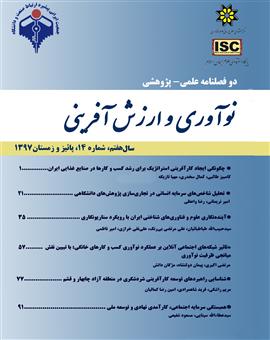شناسایی راهبردهای توسعه کارآفرینی گردشگری در منطقه آزاد چابهار و قشم
محورهای موضوعی : عمومیمریم راشکی 1 , فرید شاهمرادی 2 , امین رضا کمالیان 3
1 -
2 - دانشگاه سیستان و بلوچستان ،زاهدان، ایران
3 - دانشگاه سیستان و بلوچستان ،زاهدان، ایران
کلید واژه: راهبرد, کارآفرینی, توسعه گردشگری,
چکیده مقاله :
ﮔﺮدﺷﮕﺮی ﺗﺄﺛﯿﺮ ﻓﺮاواﻧﯽ بر اﺑﻌﺎد اﻗﺘﺼﺎدی، ﻓﺮﻫﻨﮕﯽ و ﺳﯿﺎﺳﯽ ﮐﺸﻮر میگذارد. هدف پژوهش حاضر شناسایی راهبردهای مؤثر بر توسعه کارآفرینی گردشگری در مناطق آزاد چابهار و قشم می باشد. جامعه آماری را مدیران مناطق آزاد، متخصصان و مدیران شرکتهای مسافرتی و گردشگری و صاحبان کسب وکار در مناطق آزاد چابهار و قشم تشکیل دادهاند. پژوهش به روش پیمایشی و ابزار گردآوری پرسشنامه محقق ساخته بوده که بعد از برآورد روایی(با استفاده از نظرات اساتید راهنما و مشاور و تحلیل عاملی تاییدی) و پایایی پرسشنامه از طریق ضریب پایایی آلفای کرونباخ استفاده گردید و با استفاده از نرم افزار SPSS21 آزمون فریدمن و مستقلT محاسبه و مورد تجزیه و تحلیل قرار گرفتند. نتایج حاصل بیانگر این است که راهبرد تنظیمی، راهبرد شناختی و راهبرد هنجاری به عنوان سه راهبرد کلی توسعه کارآفرینی گردشگری در مناطق آزاد محسوب میشوند که در مجموع شامل9 مؤلفه و36 شاخص توسعه کارآفرینی گردشگری میباشند. همچنین نتایج حاصل از آزمون فریدمن نشان میدهد که راهبرد تنظیمی از اولویت مهمتری نسبت به دو راهبرد دیگر برخوردار است و اهمیت بالاتری دارد.
Tourism has great impact on the country's economic, cultural and political dimensions. The purpose of this study is to identify effective strategies for developing tourism entrepreneurship in Chabahar and Qeshm free regions. The statistical population consists of free-field managers, specialists and managers of travel and tourism companies and business owners in the Chabahar and Qeshm free regions. The research was a researcher- made method and a researcher-made questionnaire was used to collect the data. After assessing the validity (using the opinions of the supervisors and counselors and verifying factor analysis), reliability of the questionnaire was used through Cronbach's alpha reliability coefficient. Using SPSS21 software, Friedman test and independent T were calculated and analyzed. The results indicate that regulatory strategy, cognitive strategy and normative strategy are considered as three general strategies for the development of tourism entrepreneurship in free zones, which consist of 9 components and 36 indicators of tourism entrepreneurship development. Also, the results of the Friedman test show that the regulatory strategy has a more important priority than the other two strategies and is more important.
